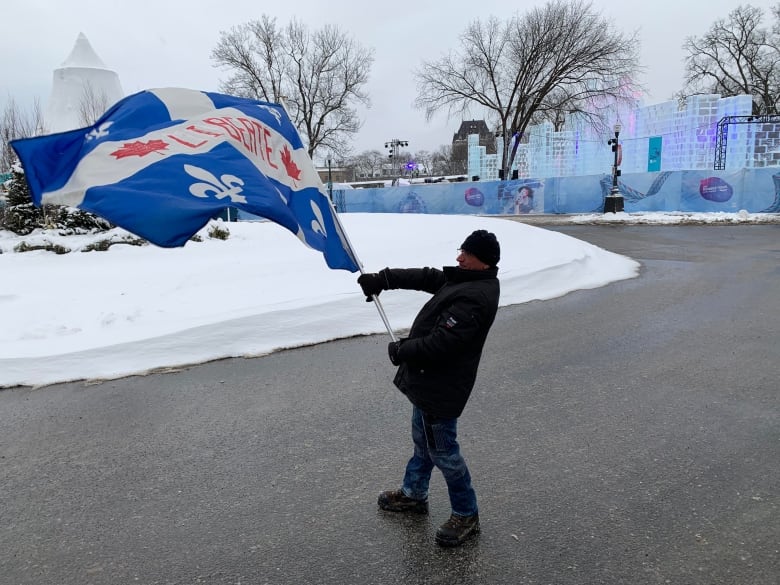COVID-19 in Quebec: What you need to know this weekend
Quebec City police hand out tickets as protesters gather around National Assembly

- On Sunday, Quebec reported 2,411 people in hospital (a decrease of 36 from the previous day), including 177 in intensive care (a decrease of four from the previous day).
- The province reported 2,568 new cases of COVID-19 and 22 deaths.
- Since the start of the pandemic, there have been 880,952 confirmed cases and 13,475 people have died.
- The province also reported Sunday a total of 18,177,418 doses of COVID-19 vaccines administered, including 37,258 in the last 24 hours.
- 91 per cent of the eligible population in the province (aged five and up) have received one dose of the vaccine; 85 per cent have received two doses, and 47 per cent have received three doses.
The new cases are those reported to the Quebec government only. They are believed to be an underrepresentation of the virus's spread, given the limited availability of PCR tests and use of home testing kits.
Montreal Mayor Valérie Plante called on Quebec and public health to provide a concrete reopening plan for the cultural sector to protect the city's reputation and economic development.
Venues need clear health guidelines to plan their events, Plante said at a news conference Sunday, accompanied by Glenn Castanheira, general manager of Montreal's downtown business association and Yves Lalumière, president of Tourisme Montréal.
"Other provinces have this plan, they have this predictability, but not Quebec," she said. "Montreal, as a cultural metropolis, economic locomotive, needs this plan to support its entire [cultural] industry."
As of Monday, theatres and other venues can reopen at 50 per cent capacity to a maximum of 500 people (1,000 for outdoor events), with vaccine passports required.
Protests in Quebec City wane
Quebec City police made one arrest after crowds of protesters opposed to COVID-19 restrictions converged in front of the National Assembly Saturday.
Officers arrested a 31-year-old man for blocking traffic with his vehicle.
Police issued 11 tickets to protesters for disturbing the peace and 10 for violating the Highway Safety Code.
Since Thursday evening, trucks and smaller vehicles poured into the city from across the province.
Convoys of drivers came from different parts of the province including the North Shore, Lower St-Lawrence, Saguenay and Beauce regions.

Mixed messaging on masks for sports
Sports are slowly resuming across Quebec, but some young athletes are frustrated with the muddied guidelines around when and where masks must be worn.
Children and youths under 18 were allowed to return to indoor sports on Jan. 31, for practices only, with gatherings limited to 25 people. The province has said masks must be worn at all times, for all ages, if a sport is taking place in a school or as an extracurricular activity.
However, if the sport is taking place in a public space, such as a municipal facility, the new rules depend on the age of the participants: children under the age of 10 are not required to wear a mask. For all those 10 and up, a mask is mandatory at all times, except during an intense period of play, the Health Ministry said this week.

When asked to clarify the rules last week, interim director of public health Dr. Luc Boileau said that he recommends wearing the mask at all times, "but if there are very intense activities, it is understandable that it may not be worn."
"It is obvious that if you are very hot, you are doing an intense sport, you are on the ice, for example, you could take off the mask if you feel more comfortable taking it off," said Boileau.
Hospitalizations could rise in February
Public health officials in Quebec are warning that the relaxing of COVID-19 restrictions in recent weeks may lead to an increase in hospitalizations in February, but they admit it's difficult to say with certainty.
"We shouldn't worry too much, but it's quite likely that the lifting of measures will lead to more contagion, with the risk in particular of seeing more hospitalizations," said the interim director of public health, Dr. Luc Boileau, at a news conference Wednesday.
The number of COVID-19 patients occupying hospital beds in Quebec have steadily declined over the last couple of weeks, and the latest projections from Quebec's institute of public health, INSPQ, suggest that decline could continue, but that the relaxing of public health measures may slow the decline or cause an increase in cases in the weeks to come.
Boileau said much of what happens will depend on the behaviour of Quebecers. He said social distancing, masking, and getting vaccinated remain important.
Top COVID-19 stories
- Community workers are keen to tackle Montreal's pockets of unvaccinated
- Quebec was among the first to test wastewater for COVID-19. Then it stopped funding the research
- Quebec announces plan to reopen restaurants, cinemas in coming weeks
- As Quebec moves to ease COVID-19 restrictions, daily death toll remains in double digits
- What to do if you think you have the Omicron variant
What are the symptoms of COVID-19?
- Fever.
- New or worsening cough.
- Difficulty breathing.
- Sudden loss of smell without a stuffy nose.
- Gastrointestinal issues (such as nausea, diarrhea, vomiting).
- Sore throat
- Generalized muscle pain.
- Headache.
- Fatigue.
- Loss of appetite.
If you think you may have COVID-19, the government asks that you call 1‑877‑644‑4545 to schedule an appointment at a screening clinic.
To reserve an appointment for a COVID-19 vaccine, you can go on the online portal quebec.ca/covidvaccine. You can also call 1-877-644-4545.
You can find information on COVID-19 in the province here and information on the situation in Montreal here.
With files from La Presse Canadienne and Radio-Canada